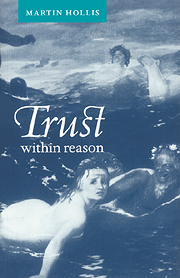5 - Fairness and morality
Published online by Cambridge University Press: 06 January 2010
Summary
Impartiality looks likely to help Adam and Eve on their way, since it detaches each from their own point of view. Yet it cannot simply be the detachment which gets Adam to think of all his states or selves, rather than those of the immediate moment, since his need to arbitrate between his earlier and later ones is unpuzzlingly for his own benefit. How he chooses among his present, earlier and later selves and whether he is to be identified with one, all or none of them are interesting questions. But, while nothing normative intrudes on the predictions of his present self about the actions of a later one, there is still a difference between two Adams and the relation of Adam to Eve. With Adam and Eve to think about and trust at issue, impartiality turns trickier. Although they have become more complex since the start, being by now two-tier agents able to reflect that their preferences are interfering with their interests, they need something more before they can rule against themselves and trust one another.
Yet we seem to have dealt them some useful cards, if only they could play them. What is stopping them? Part of the answer, I think, is that for Adam alone there is finally only one point of view, whereas for Adam and Eve there are three: his, hers and theirs. Given the strong assumption of individualism, however, ‘theirs’ is an amalgam of his and hers, and impartiality is, in effect, anonymity between individuals – a device for disregarding who in particular gets what in a distribution of utilities.
- Type
- Chapter
- Information
- Trust within Reason , pp. 82 - 104Publisher: Cambridge University PressPrint publication year: 1998



